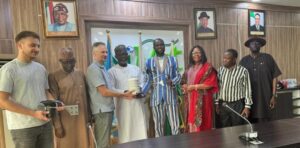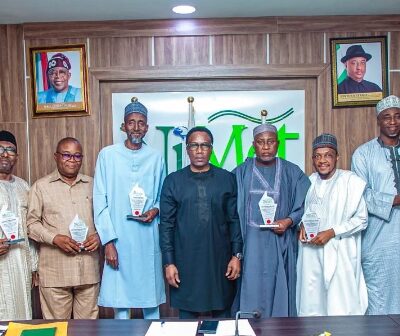BY OLAPEJU OLUBI
The Nigerian Meteorological Agency (NiMet) is taking a major leap in modernising climate monitoring with the deployment of innovative Internet of Things (IoT)-powered, LoRaWAN-enabled weather stations across Nigeria’s cities.
The initiative, driven through a collaboration with Barani Design Technologies and the West African Science Service Center on Climate Change and Adapted Land Use (WASCAL), is set to revolutionised how urban weather data is collected and analyzed.
Speaking at the launch, NiMet’s Director-General/Chief Executive Officer represented by Engr. Hamid Abdulkareem, Director of Engineering and Technical Services, hailed the partnership as “a strategic and innovative milestone in Nigeria’s weather forecasting value chain.”
He noted that the donation of the advanced stations will strengthen NiMet’s mission of delivering accurate and timely meteorological data.
“This initiative marks a significant step forward in our commitment to providing accurate and timely weather information. These advanced weather stations will be instrumental in helping us achieve our targets,” he said.

Abdulkareem added that the donation complements the 25 Barani Automatic Weather Stations (AWS) already operational in NiMet’s network, with 59 additional compact stations currently being reactivated nationwide to boost observation and forecasting capacity.
The DG further urged Barani Design Technologies and WASCAL to involve NiMet’s technical teams in all future capacity-building opportunities, emphasizing that sustainability and seamless data transmission to the agency’s central system remain top priorities.
In his remarks, Mr. Jan Barani, CEO of Barani Design Technologies, expressed appreciation for NiMet’s leadership and collaboration. He described the newly developed smart weather stations as a leap toward building climate-resilient, data-driven urban systems.
“This new generation of energy-efficient, IoT-enabled weather stations is designed to enhance data accuracy and reliability across cities. Traditional weather stations often face limitations in measurement consistency and relocation challenges, this innovation solves that problem,” Barani stated.
Mr. Diallo Abdulaziz, Coordinator, Data Management Department at WASCAL, highlighted that the partnership will significantly strengthen NiMet’s national meteorological network by improving both power and connectivity infrastructure.
Built to meet World Meteorological Organization (WMO) standards, the new IoT weather stations promise globally comparable, high-quality data.
The integration of smart technologies and low-power systems ensures efficient, continuous monitoring, a crucial development for weather forecasting, climate analysis, and disaster preparedness in Nigeria’s increasingly urbanized environment.
With these advancements, NiMet bolsters its position as a regional leader in digital meteorology, and Nigeria takes another confident step toward a smarter, more climate-resilient future.
Olapeju is a journalist and aviation reporter.




